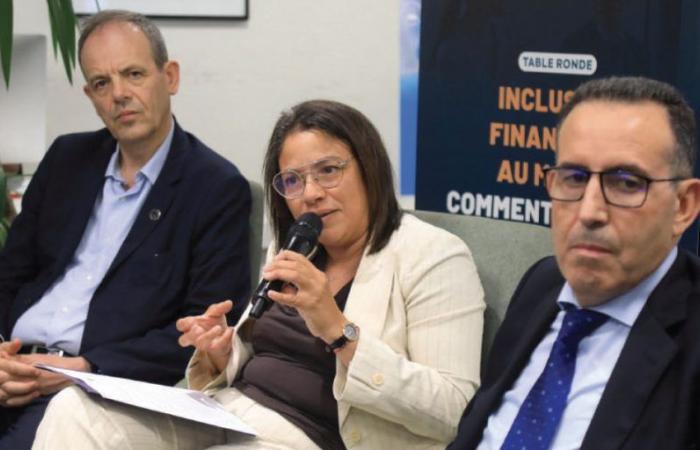Panelists shared their visions to analyze how technology, strategic partnerships and responsive regulation are key to transforming the country’s financial landscape and achieving true and sustainable economic inclusion.
Financial inclusion in Morocco is rapidly transforming through the adoption of new technologies. Fintechs, tech insurance and the use of data are profoundly changing the business models and approaches of traditional players.
This article explores how these developments, driven by strategic partnerships and adapted regulation, are shaping the future of financial inclusion in the country. These perspectives were shared by the experts making up the panel of the debate organized by Les Inspirations ÉCO as part of the Cercle des ÉCO, on June 6, bringing together Hakima Alami, Mehdi Benbachir, M’Hamed El Moussaoui, and Xavier Reille.
Data revolution
For Xavier Reille, the future of finance is exciting, marked by an unprecedented technological revolution.
“The rise of fintech and insurance tech is transforming the financial landscape, making the next ten years very different from the previous ones. Data is the engine of this transformation. Without data, it is impossible to develop solutions adapted for specific segments such as young people, women, VSEs and small farmers,” he explains.
To change the economic model, it is necessary to change the method of understanding customers, based on information such as payment habits for electricity bills or telephone services.
This approach, similar to profiling, is at the heart of the new data revolution. The Central Bank of Morocco plays a crucial role in this transformation, by developing the necessary infrastructure such as the credit bureau and the electronic security register. “The new law on the credit bureau will make it possible to collect non-bank data, thus facilitating access to credit for many Moroccans.” The technological revolution should make it possible to increase the ownership rate from 44% to 66% in the next three years,” hopes Xavier Reille. He also underlines the importance of Moroccan fintechs which innovate and compete with traditional banks, such as Sowit in agritech, which collects data on small farmers.
Partnerships and performances
Morocco has made significant progress in financial inclusion, despite numerous challenges. The World Bank’s Findex surveys attest to this, showing an increase of 20% between the last two surveys. Collaboration between the Central Bank, the Ministry of Finance and other stakeholders is one of the keys to this success.
M’Hamed El Moussaoui also believes that future progress will be mainly due to technology. “Technology offers us unprecedented opportunities to financially include segments furthest from the traditional banking system.”
To succeed, it identifies three essential elements: collaboration between banks, payment institutions and microcredit associations; the development of mobile payment; and a favorable regulatory framework, in particular open banking which will offer more room for maneuver to fintechs.
“None of these three actors can succeed alone in deploying financial inclusion in the rural world, which is one of the priority objectives of the national strategy… They must work together to create suitable ecosystems”, affirms M’Hamed El Moussaoui.
The Central Bank identified in its strategy rural areas where there was a lack of an access point, bank branch, payment institution or AMC, recalls Hakima Alami. The population density of these areas, for example below 10,000 inhabitants, can make the opening of a bank branch ineffective. The BAM representative underlines the importance of the work carried out by banks, such as Al Barid Bank, whose effort to create mobile agencies has made it possible to respond to some of these issues.
“Mobile agencies are an innovative solution for providing basic financial services to rural populations,” explains M’Hamed El Moussaoui.
The distribution model of payment institutions has also been adapted, as well as that of telecoms infrastructures, of which the regulators have been approached, “so that tomorrow there will no longer be a white zone in Morocco”.
Agility and innovation
Hakima Alami highlights the importance of skills development for the regulator. The Central Bank continually adapts its supervisory tools based on international best practices. She also works with the general management of cyber risks, which constitutes a key subject for all stakeholders. This technological monitoring is crucial to guarantee financial stability and develop resilient payment systems.
Mehdi Benbachir underlines the importance of agility for banks. “We have adopted an agile organization, using concepts like ‘tribes’, ‘squads’ and ‘sprints’. This collaborative approach with fintechs and other establishments makes it possible to accelerate projects and better meet customer needs.
Differentiation of channels and segments is essential to achieve the goal of economic inclusion. “For successful inclusion, we must adapt our services and products to the specificities of each customer segment,” he adds.
In conclusion, the future of financial inclusion in Morocco is closely linked to technological innovation and collaboration between different actors. To fully understand customer needs and offer tailored solutions, a holistic approach integrating fintechs and new technologies is necessary. The ultimate goal remains economic inclusion, which cannot be achieved without a complete understanding and adequate response to the diversified needs of customers.
Murtada Calamy / ECO Inspirations






